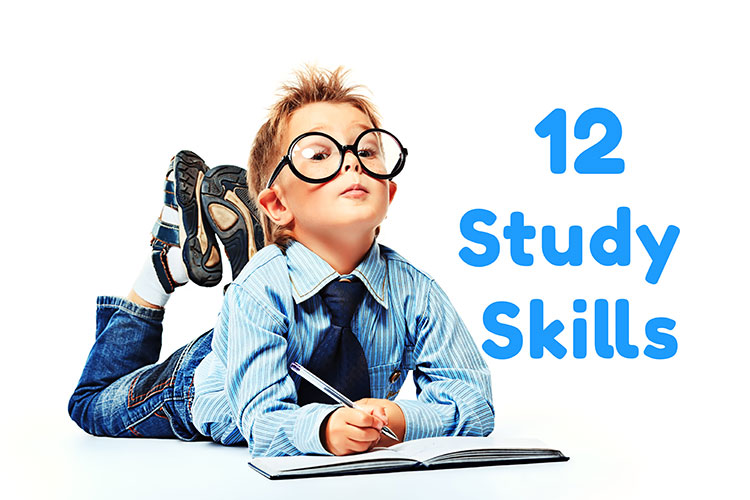


Study Skills for Kids – I worked hard in school for academic success, I got good grades, and I studied and studied and studied. For that work I received A’s on my report cards, was on the honor roll, and my parents were happy. All I did was study, every day and every night. No one told me how, so I just looked at the paper reading and making notes over and over. As the mantra goes… I wish I knew then what I know now.
When I was young my Dad told me, “work smarter, not harder.” He told me, but he never said how. After time had passed, I thought about it again. Now I have a better understanding of what that really meant. How you approach what you learn makes a difference in the process and order of studying. It is possible to make learning and retaining information easier if you can make connections. Breaking down information to make more efficient pathways for remembering and analyzing new concepts can make studying fun. It does not have to be a struggle.

I also came to the realization that your approach to academic success, while you are in school, gets you more engaged in the learning process. That engagement affects how open you are to learning new things as an adult. This is where I realized there is a significant need for Study Skills.
Study skills for kids are almost always thought of as an isolated academic concept. For students, parents and educators commonly speak of study skills for kids as though they were a defined thing. Not only is it not well defined, but it also is not the same for everyone. What is more problematic is that once a student develops a method for studying, they stick with that one way of doing things regardless of whether or not it is right for each situation.
“I call it the law of the instrument, and it may be formulated as follows: Give a small boy a hammer, and he will find that everything he encounters needs pounding.” – Kaplan

Now that these specific skills have been identified, it is time to define them and see how each is used.
Managing Your Attitude – This skill is about the need for students to understand how their attitude affects their work. Once there is an understanding of how attitude affects learning, students need to find ways to create a positive attitude towards learning their material. Additionally, students need to understand how to find relevance in what they are learning, which makes the material more interesting and easier to relate to.
Goal Setting – This skill is about identifying what a student wants to achieve. Students need to create realistic goals that will help them determine how to study. To be effective, goals need to be made using the CAM method; Clear, Achievable, and Measurable.
Time Management – This skill is for juggling multiple demands on a student’s time through the use of a schedule. Students should generally work on assignments in small portions. Tracking when an assignment is given and when it is due is critical for this skill.
Project Planning – This skill is for identifying methods to break a project down into sequential tasks. Students need to organize tasks and check off when major portions have been completed.
Organization – This skill is the process of placing material and information into logical containers. Students need methods of storing their material or categorizing the notes that allow them to be able to find tools or information as needed.
Active Reading – This skill is important for helping a student be part of the process. This is where students ask questions about what they will be reading, before going over the material. By asking questions, and looking at what they are about to read, students are better prepared to absorb information from what they are reading.
Note Taking – This skill is the ability to write down shortened versions of what is being said, viewed, or what a student has read. Note-taking allows a student to consolidate large amounts of information into more manageable pieces. Those smaller pieces make for more efficient studying.
Avoiding Distractions – This skill allows a student to focus on what they need to accomplish. Students need to learn how to keep focus when surrounded by gadgets, friends, and sometimes even family. They need to learn how to create study spaces at home and at school.
Memorization Strategies – This skill is needed for managing large amounts of information, particularly lists. Students need to learn how to take information from short-term memory and store it in long-term memory.
Math Strategies – This skill is focused on the logic of math. These are concepts that build on each other. These strategies work on making sure foundational material is well understood before moving on to more difficult concepts.
Group Study Strategies – These study skills for kids allow a student to work in a group dynamic. Students need to understand how to divide their labor and monitor each other’s performance. Students also need to learn both leading and following in a team setting.
Test-Taking Strategies – This skill is devoted to preparing for and taking quizzes, exams, and tests to achieve academic success. Students learn how to effectively prepare for tests not only by studying correctly but by getting enough rest and taking care of themselves so they can focus on the exam. Students also get strategies for different types of questions and learn how to read the instructions and questions carefully.

Defining the components of Study Skills can help students, parents, and educators select the correct strategy for student academic success. When those strategies are learned and then used, students should see a reduction in the time it takes to learn and increases in the amount of information retained from study time. The more tools a student has in their academic toolbox, the better they will be able to build their academic future.
At Grade Power Learning, we teach the importance of time management, problem-solving, and homework techniques. We promote active thinking and teach children to discover their own learning process. Students are encouraged to take chances, make leaps, and try and try again.
4kids.com has a huge resource of tutoring providers. To find out more, visit the Tutoring Category. You can also read more of the Education Category blog post.
Just enter your email address below and you’ll get an email every time we publish a new post!
Categories :
Tags :
We believe in building & supporting the community and that finding the resources and things to do for your kids should be easy. 4kids.com is a FREE online resource guide for families with kids in a city near you.
View All PostsNotifications